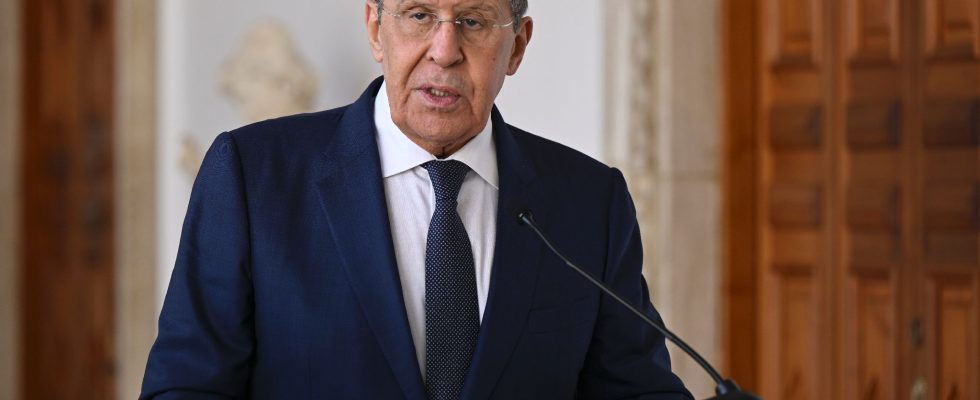While Ukraine is still preparing its counter-offensive, Russian Foreign Minister Sergei Lavrov arrived in Havana on Wednesday evening from Nicaragua where he had spoken with President Daniel Ortega. In Cuba, he will meet the re-elected Cuban president without surprise.
For its part, Brussels announced, on Wednesday, new financial aid of 100 million euros to the countries of Eastern Europe which blocked the import of Ukrainian cereals.
Lavrov arrives in Cuba after whirlwind visit to Nicaragua
Sergei Lavrov will meet Cuban President Miguel Diaz-Canel on Thursday, unsurprisingly re-elected Wednesday as head of Cuba, and his Foreign Minister Bruno Rodriguez Parrilla, according to a ministerial statement.
The head of Russian diplomacy had made a whirlwind visit to Managua on Wednesday before flying four hours later to Cuba, the last leg of a diplomatic tour of Latin America which also took him to Brazil and Venezuela. “Westerners, under the aegis of countries like the United States […] try to proliferate their hegemony through conflicts like in Ukraine,” Sergei Lavrov said in a televised statement before his departure from Nicaragua.
Russia is an important ally for Nicaragua, to which it supplies wheat, but also buses for public transport, taxi cars and Sputnik vaccines against Covid-19. Moscow also provided cooperation for an anti-narcotics police training center, as well as technical and military support.
A flash in the sky of kyiv
“Around 10 p.m. (9 p.m. in Paris), the glow of an aerial object was observed in the sky of Kiev,” said Wednesday evening the head of the military administration of Ukrainian capital, Sergiy Popko, on Telegram. “According to initial information, this phenomenon is the consequence of the fall of a NASA satellite on earth,” he added, while the flash caused a lot of reactions on social networks.
NASA had announced earlier in the week that a satellite of some 300 kg, Rhessi, would return to the atmosphere at an undetermined time on Wednesday. But in a statement released Wednesday, NASA says its satellite had not yet entered the atmosphere at the time kyiv said. The Pentagon predicts that Rhessi “will re-enter Earth’s atmosphere at approximately 8:50 p.m. Wednesday (2:50 a.m. Thursday morning, Paris time) with a window of plus or minus an hour,” the agency said. “No other NASA satellite has re-entered the atmosphere earlier than [mercredi]”, she also said.
An AFP journalist saw a flash in the sky which was followed by no sound. The air alert was activated, underlined the head of the military administration of the Ukrainian capital, Sergiy Popko, while specifying that “the air defense did not come into action”.
Ukraine received the first American Patriot air defense systems
The Ukrainian army has received the first American Patriot air defense systems, Defense Minister Oleksii Reznikov announced on Wednesday. “Today our beautiful Ukrainian skies are becoming safer, because Patriot air defense systems have arrived in Ukraine,” he said. Twitterthanking the United States, Germany and the Netherlands for “keeping their word”.
In recent weeks, Volodymyr Zelensky’s army has indeed obtained heavy tanks and long-range guns from its Western allies. She promises to launch a major counter-offensive as soon as the weather permits. The Russians had wanted to regain the initiative this winter by relaunching their assault in the east, but so far their advances have been limited and their losses heavy.
Ukrainian cereals: EU promises new aid to Eastern Europe
The European Commission announced on Wednesday new financial aid of 100 million euros to the countries of Eastern Europe. For a few days, the latter have banned the import of Ukrainian cereals to face the discontent of their farmers.
The European Union has indeed suspended customs duties on all products imported from Ukraine. But instead of a simple transit, neighboring European states have seen maize, wheat or sunflower from Ukraine pile up on their soil due to logistical problems, which has caused local prices to plummet.
Consequence: Poland, Hungary, Slovakia and Bulgaria have decided to ban the purchase of wheat and other Ukrainian products. To avoid this type of unilateral measures, the European Commission released a new envelope on April 19. It will complement an initial aid of 56.3 million euros granted last month, intended to support the most affected operators.
